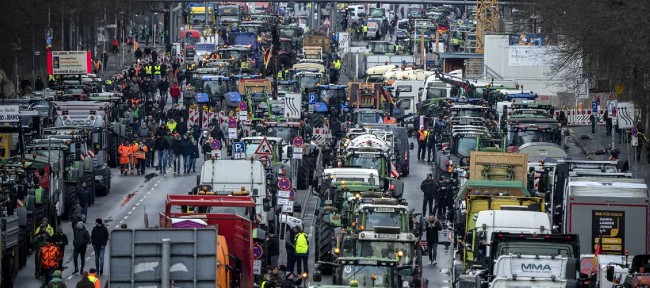Truckers' Protests in Europe: Impact, Causes, and Implications
In recent weeks, Europe has witnessed a wave of truckers' protests...
22 de Enero de 2024
In recent weeks, Europe has witnessed a wave of truckers' protests, with drivers taking to the streets to voice their grievances and demand action on various issues affecting the industry. The protests have garnered significant attention, highlighting the challenges faced by truckers and the broader implications for transportation, supply chains, and economic activity across the continent.

One of the key drivers of the protests has been the rising fuel prices, which have significantly impacted the operational costs for truckers. The surge in fuel prices, exacerbated by geopolitical tensions and supply chain disruptions, has strained the financial viability of trucking operations, prompting drivers to call for relief measures and policy interventions to address the escalating costs.
In addition to fuel prices, the protests have also highlighted concerns about working conditions, road safety, and regulatory burdens faced by truckers. Issues such as long working hours, inadequate rest facilities, and complex regulatory requirements have been central to the grievances voiced by protesters, underscoring the broader challenges confronting the trucking industry and its workforce.
The protests have reverberated across Europe, disrupting transportation networks, causing delays in supply chains, and prompting discussions about the implications for the broader economy. The impact of the protests on trade, commerce, and the movement of goods has drawn attention to the essential role of truckers in sustaining economic activity and the potential consequences of prolonged disruptions in the industry.
As the protests continue to unfold, policymakers, industry stakeholders, and the public are closely monitoring the developments and considering potential responses to address the underlying issues. The protests have sparked debates about the need for comprehensive solutions to support truckers, enhance the sustainability of the industry, and mitigate the broader ramifications of the unrest on Europe's economic landscape.
Amid the ongoing truckers' protests in Europe, the focus on the impact, causes, and implications of the demonstrations has underscored the significance of the trucking industry and its interconnectedness with the functioning of the continent's economy, prompting a critical examination of the challenges faced by truckers and the imperative for meaningful responses to address their concerns.
